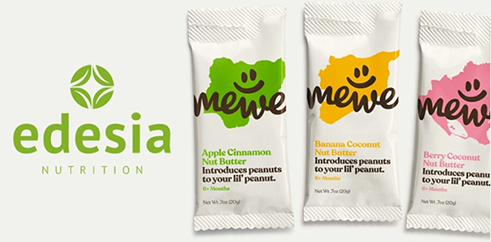News & Press.
NOSH // JUL. 23, 2019
MeWe Fuels the Fight to Prevent Peanut Allergies
For manufacturers and distributors, operational challenges are common, but Edesia Nutrition founder Navyn Salem also navigates government relationships to spread fortified peanut butter to malnourished children around the world. Now the nonprofit is also shifting to the consumer side to help solve the problem of peanut allergies.
In 2009 Salem founded nutrition nonprofit Edesia to produce and distribute ready-to-use foods (RUFs) via partnerships with nonprofits and government agencies. The company’s nut butters, which include Plumpy’Nut, are made of peanuts, milk or soy powder, sugar, vegetable oil, vitamins and minerals, with varying products catering to the location and age group to which they’re distributed. The effort has reached over 9 million children in over 52 countries, and increases yearly, Salem told NOSH, with 1.4 million people already reached in 2019.
But now Edesia is also shedding light on a problem unique to the U.S. — the predominance of peanut allergies. In March, Edesia launched a fresh consumer-facing brand, MeWe, starting with a line called MeWe Baby: peanut butters formulated to introduce 6-month-old babies to peanuts to prevent allergies later in life. Based on the success of those first products, the company will expand the line.
According to a study “Learning Early About Peanut” (LEAP) from the Immune Tolerance Network (ITN), early introduction to foods with peanuts reduced the development of an allergy in high-risk infants: 17% of the children who avoided peanuts as infants developed an allergy by age 5, while only 3% of the children who ate a peanut snack developed an allergy. The American Academy of Pediatrics endorses such methods, and other brands, such as Hello Peanut and MyPeanut, have tried to push the message further.
Salem said the concern over peanut allergies was clear and with an already established manufacturing facility in North Kingstown, R.I., Edesia had the infrastructure to help and saw an opportunity.
“We wanted to create something that wasn’t close to a potato chip or cheese puff — more closer to real food — with as close to a clean label as possible,” Salem said.
MeWe’s peanut butters have minimal ingredients: peanuts, coconut milk powder, palm oil and real fruits — banana, berry or apple — with no added sweeteners and three grams of protein. The peanut butter is sold as individual squeeze packs with a MSRP of $1.29 in about 700 stores in the Northeast, including Stop and Shop and Wegmans, where 6-pack boxes are also offered. The company’s newest launch, 10 oz. jars, debuted on Amazon earlier this month.
One aspect Salem is still working through is what category best suits the brand. While other brands and store sections cater to those with allergies, retailers don’t generally have sections for products that seek to prevent allergies, Salem said.
“It can be more challenging if you have very few competitors, but not really a clear space in the store,” Salem told NOSH. “Everyone else is trying to avoid peanuts — we’re kind of the opposite in trying to not have avoidance at this young age. It will take time, education and awareness building in terms of ‘why’ and ‘how do I do it?’”
Going forward, the food company and nonprofit will continue to work hand-in-hand to improve lives. MeWe’s food is ‘good for me’ and ‘good for we,’ with all profits going toward Edesia’s efforts to “reach more kids more efficiently” around the world, Salem explained. Originally, the line launched on Amazon in February 2018 as Little Nut, a brand name the team realized was too constraining — and would hinder later expansion: not all MeWe products will be allergy-focused, but will address specific needs for particular age groups. Salem said the next product, expected to launch in a few months, will be for young, picky eaters who need extra nutrients to grow. There’s further opportunity to serve other demographics, with the eventual goal of also targeting adults and elderly consumers needing additional nutrition support.
Salem said the brand will focus on simplified messaging to avoid consumer confusion. The company currently has 10 employees; moving forward, Salem plans to grow MeWe’s marketing and sales teams, while taking a “measured” approach to expanding, she said. So far, though, the response has been positive.
“When people understand the mission, they are very willing to open the door and talk to us,” she said. “I can’t compare to what it’s like because I haven’t done this before, but to me it seems like we’ve been really fortunate to be able to lead with [our] humanitarian story. Food with purpose seems to resonate with people.”


PROVIDENCE JOURNAL /, DEC. 9, 2018
Women in Action: Navyn Salem’s war on hunger is saving millions of malnourished children
Barrington resident has become a force in the fight against childhood malnutrition. Her 83,000-square-foot headquarters in the Quonset…